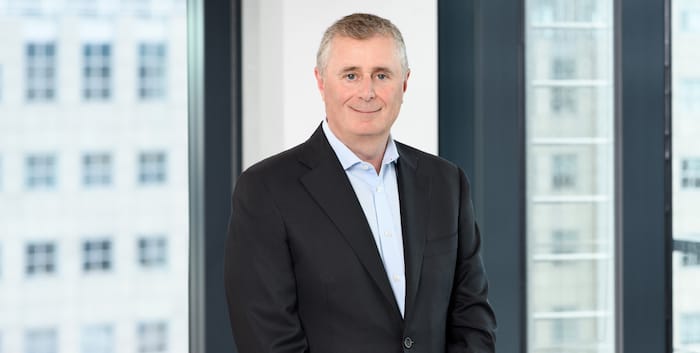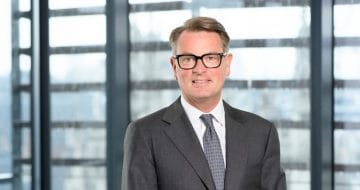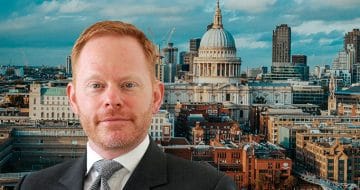Taylor Wessing partner Adam Marks reflects on his career journey to date and his latest project, City 2040, ahead of his appearance at this week’s virtual student event

After initially starting his career at Wilkinson Kimbers & Staddon in London, which is now a part of DLA Piper, Adam Marks moved to MS Marks & Co, before joining Walsh Lawson, a boutique law firm, where he became a partner.
While he enjoyed the high end work he was exposed to at Walsh Lawson, Marks admits to missing the camaraderie of a bigger firm. “I had a few clients who needed support from a bigger law firm”, Marks explains, “and I wanted to be part of a larger practice where I could focus more on my expertise instead of trying to cover a broad range of areas.” As he was approaching what he describes as “the milestone age of 40”, Marks decided to make the move to Taylor Wessing (then known as Taylor Johnson Garrett).
Since joining the firm over 20 years ago, Marks has achieved career goals that many lawyers can only dream of. He became head of real estate in 2004 and sat on the executive board of the firm as a result. In 2006 he was appointed to the international management board of the firm until he stepped down from the executive board at the end of 2007. In 2011 he was elected senior partner. “I honestly never imagined I would become senior partner”, he tells me, “but it was an incredibly interesting role that allowed me to experience many different aspects of the firm.” Marks stepped down from the position in 2017 as he believes “other people should experience these roles”, yet his career has not slowed down and he is now the partner leading the team’s advice and insights on City 2040 — an exploratory industry-led research initiative scrutinising the future UK City of 2040.
With the current climate crisis, many people are in agreement that our cities need to become greener and carbon neutral — yet how we build these cities is less clear. That’s where City 2040 comes in. “The City 2040 report considers the logistics of building green cities in a way that has never been done before,” Marks says. “It examines what these greener future cities will look like and identifies many of the challenges of how we actually get there.” The research initiative, which is in collaboration with think tank the Edge and University College of Estate Management, contemplates the financial viability of plans for future cities, how we might increase and retain urban green space and replacing single city centres with a variety of multi-hubs. According to Marks, Taylor Wessing identified an opportunity to provide clients with valuable insight potentially impacting future growth plans. Since they understand what their clients are developing or investing in, and what they are thinking about, they could therefore test the evidence and academic theory of a greener city against the real commercial concerns of their clients.
Now that the City 2040 report has been published, the team is focusing on specific areas that have come out of the research, to start the process and create the foundations needed for these future cities to develop. Marks’ enthusiasm for the project is palpable:
“It is a project that aims to add value back. It is exciting to lead on such a significant project in the real estate sector, which will hopefully improve the lives of my children and my grandchildren. It can’t be ignored any longer — if we don’t change the way our lives and cities are structured, the future will look bleak for our grandchildren.”
Although City 2040 is clearly his passion project, this supports the work Marks does with clients, and his considerable expertise in investments and the development and leisure sector. Marks acknowledged that Covid-19 and the resulting restrictions decimated the hospitality sector, but lawyers were kept busy throughout the pandemic. He says:
“We wanted to support our people and of course our clients. Our lawyers made a point of supporting clients in the hospitality sector, working with organisations like UKHospitality during the pandemic, who were under threat from their current Business Interruption Insurance contract terms. But, larger law firms like ours have fortunately been kept very busy. On the whole, people need support and legal advice through the good times and the bad, and we were in a strong position to continue our operations seamlessly, with the technology already in place to enable everyone in the firm to work remotely overnight.”
The excellent technology Marks refers to were an essential component to the survival of any firm during Covid-19 and he notes how larger law firms were better equipped to provide adequate working from home conditions. Although Marks was initially sceptical of the intricacies of so many people adapting to remote working en masse, and since he lacked as much confidence with technology as some of his younger colleagues had, he was pleasantly surprised by the success of it. “Some organisations have wanted to introduce more agile working for years”, he explains, “but some have always doubted whether such working conditions can be productive. The pandemic has proved that people can be as productive, if not more, working from home.”
Marks believes aspiring lawyers should apply to firms which embrace technological advancements since they are “forward looking and future driven”. Being in this kind of environment, Marks notes, will aid your development as a legal professional. As someone who has had a career that is anything but ordinary, Marks encourages students to strive for something similar: “Set yourself career goals and aspire for those, don’t settle for anything less. You can’t work your whole life doing something ordinary!”.
Adam Marks will be speaking alongside other Taylor Wessing lawyers at ‘Challenging expectations in a new age of change — with Taylor Wessing’, a virtual student event taking place this week, on Wednesday 20 October. You can apply to attend the event, which is free, now.
About Legal Cheek Careers posts.


